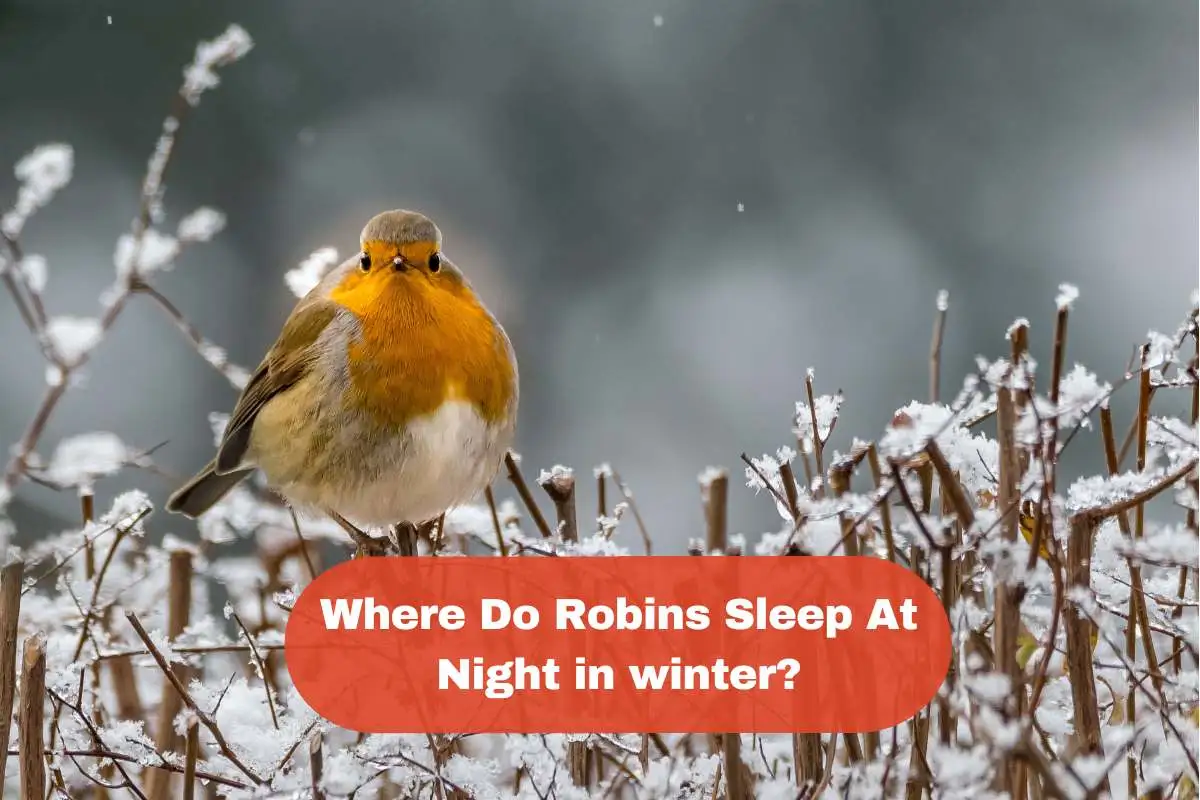For robins, winter can be a challenging time to sleep at night. As temperatures drops and food becomes scarce, it become challenging for robins to keep them warm and to survive the winter season. One of the most frequently asked questions by bird enthusiasts is where do robins sleep at night in winter and how they adapt to survive the colder months.
Robins, most of which are nocturnal, sleep during the winter in various places, including trees, bushes, and even on the ground. They may roost alone or in groups to protect themselves from the cold weather. They may also take shelter in birdhouses or other structures provided by humans.
Some robins migrate to warmer climates during the winter, while most of them stay in their breeding territory and adapt their sleeping habits to survive the colder temperatures.
Also read a recent publish article about American robin eye-vision at night and haunting technique to survive in winter.
Do robins build nests for sleeping in the winter?
Robins do not build nests on their own to stay or sleep in the winter. They typically roost and sleep in trees hole, bushes, and other structures, such as birdhouses, for protection from winter and predators.
Robins roost in groups or alone to protect themselves from the cold weather. They may use abandoned nests from previous years, but they do not usually construct new nests specifically for sleeping in the winter.
How do robins survive freezing temperatures during the night?
Robins survive freezing temperatures by roosting in groups, which allows them to huddle together for warmth.
Robins also have other tricks up their collective sleeves. They often fluff their feathers to create an insulating layer of air around their bodies. They may also roost in protected areas such as trees or bushes, which can provide shelter from the wind and cold.
Additionally, robins have the ability to lower their body temperature at night to conserve energy and survive in freezing temperatures.
During the winter, robins eat high-energy food such as berries and fruits to maintain their body fat levels and help them survive the freezing temperatures.
They also have the ability to enter a torpid state, which is similar to hibernation, where their metabolic rate slows down and reduces their need for food, helping them to survive cold nights.
What impact do snow and ice have on where robins sleep at night?
During heavy snow or icy conditions, robins may have a harder time finding suitable roosting spots. Their usual roosting places, such as trees or bushes, may be covered with snow or ice.
During heavy snow or icy conditions, robins may have a more challenging time finding suitable roosting spots. Their usual roosting places, such as trees or bushes, may be covered with snow or ice.
In such conditions, robins may have to roost in more exposed areas. For example, they may have to perch on the ground. This can make them more vulnerable to predators and harsh weather.
They may also have to roost in larger groups to help stay warm. Huddling together in a group can protect them from the cold weather while attracting predators.
In addition, deep snow and ice can make finding food harder for robins, which can stress their ability to survive the winter.
How do robins adapt their sleeping habits during the winter?
During the winter, robins adapt their sleeping habits by roosting in groups to stay warm, fluffing their feathers to create an insulating layer around themselves, and finding protected areas such as trees or bushes for shelter.
They also lower their body temperature at night to conserve energy and survive the cold. They may enter a torpor state, similar to hibernation, where their metabolic rate slows down, reducing their need for food and helping them survive.
Robin birds have several adaptations that allow them to survive cold winter nights. They adjust their sleeping habits so they can sleep without shivering.
Do robins migrate or stay put during winter?
Robins are non-migratory birds and typically stay in their breeding territory during the winter. Unlike many other bird species, they do not migrate to warmer climates.
They have developed ways to survive the winter months. For example, they fluff their feathers, roost in groups, and find protected areas where they can stay warm.
However, some robins may travel short distances in search of food or to escape harsh winter weather conditions.
Do robins sleep standing up?
Yes, robins can sleep while standing on one leg. This is common among many bird species, who do it to conserve energy and stay alert for potential predators.
Standing on one leg also helps birds maintain balance and prevent falling off branches or perches. Some birds, including robins, can enter a light sleep state while standing, which allows them to conserve energy and be more alert for potential dangers.
This behavior is known as unihemispheric slow-wave sleep, which is thought to be a unique adaptation of birds to their environment.
Where do European robin migrate during winter?
European Robins (Erithacus rubecula) are generally non-migratory birds and do not migrate. They stay in their breeding territory during the winter, according to a study published in the Journal of Avian Biology in 2007.
The study found that less than 5% of European robins migrate during the winter, with most birds staying put throughout the year.
In a 2010 study published in the Journal of Avian Biology, researchers found European robins are able to survive the winter by reducing their body temperature, reducing their activity, and entering torpor.
These findings also indicate that European robins are not migratory birds, but only a few individuals migrate short distances.
Moreover, a study published in the journal of Animal Behavior in 2016 found that European robins that stay in their breeding territories during the winter reduce their energy expenditure by lowering body temperature and activity at night. They also adopt torpor.
Did I answer everything you need to know about where do robin sleep at night during winter?
In this article, I have discussed where robins sleep at night during the winter. The above article provides detailed information on the roosting habits of robins and the factors that can impact where they sleep.
The article also explores how robins survive the winter, including their sleeping habits and how they adapt to colder temperatures. By learning more about the habits of robins, we appreciate their challenges and how they survive the winter season.

